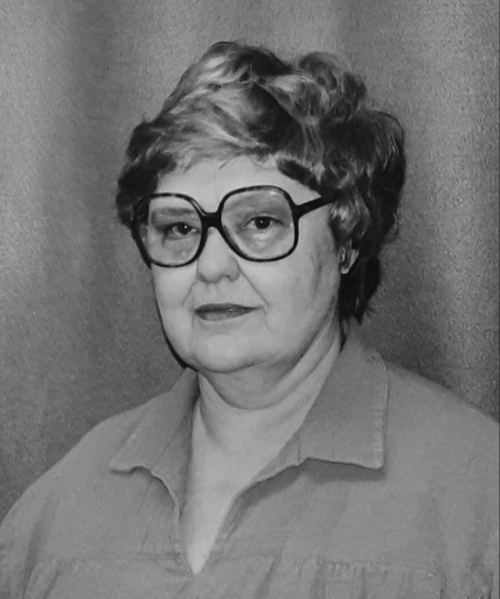This content was published: February 19, 2021. Phone numbers, email addresses, and other information may have changed.
The Great Uncluttering: Poetic and Spiritual Metaphor of a Generous Writer
Justin Rigamonti
The poet Carolyn Moore was a tall woman. A model in her youth, she had an outsized personality and a huge sense of wit. “She was larger than life,” insists her best friend and constant companion in writing workshops, Laura Weeks, who was three-quarters the height of Carolyn. “We were like Mutt and Jeff,” she laughs— a century old comic strip about two friends, one half the height of the other.

Poet Carolyn Moore
Carolyn’s stature likely came from her mother’s side, the “Olson” side. Those roots were Scandinavian: part Swedish, part Norse. She was fiercely proud of this heritage and would often drape Swedish flags over the balcony of her log cabin home in Tigard, Oregon. Even her tablecloths were yellow and blue.
In the epigraph to her aptly-named poem The Garden of Enormous Language, Carolyn quotes an overheard line about the Olson women; they are, according to some anonymous soul at the Scholls Grange Annual Chuckwagon and Craft Bazaar, “hard-workers, year in and out.” The poem goes on to confirm this. “In summer,” it says, speaking in the voice of an Olson, “we mothers of gorgeous sweat/ water, weed, and hoe all the hot sky long.”
Carolyn carried on the Olson legacy of culture and harvest, spending many hours in the garden and fruit orchard she and her father lovingly tended on “the last vestige of the family farm,” in the years after her mother died. Each autumn, they held a celebratory cider-pressing event, inviting family and friends to come mash the newest crop of apples. But the greater portion of Carolyn’s toil was spent in another field, the one she found indoors at her computer keyboard.
“My chief love is poetry,” she said in a 2010 interview with Interrobang Magazine, “by far the most demanding genre in which I’ve struggled and therefore the most challenging and most addictive one.”
According to Laura, whom Carolyn called her “chief enabler,” Carolyn wrote her poetry using a method she called “composting.” She would jot down notes, memories, phrases, and then hold them in her notebooks and computer files for weeks or months, allowing them to gestate. Even the work she did to support her poetic “addiction”— her twenty years of teaching at Humboldt State University in Arcata, California and the researching and re-writing of “passages for comprehension tests… for subjects ranging from ionic soil stabilizers to the history of the toothbrush”— served as a means of gathering phrases, hoarding them, which she would then draw from and organize, taming the wildness of language into crafted, iambic rows. She called it “wrestling words to the paper mat,” and one imagines an Olson woman, wrist deep in the pungent loam, alchemizing yesterday’s dead into furrows of new life.
Carolyn usually worked in blank verse, unrhymed iambic pentameter, but once a poem was ironed out on the page, she would put it through a rigorous “free verse diet” to help “weed out phrases and words that function as unnecessary filler.” And this cycle of gathering and trimming, hoarding then releasing, cluttering and decluttering, wasn’t just a hallmark of her poetic process. It was a constant theme within her work as well.
In her poem “Instructions for Fall Cleaning,” she writes that “Fall’s for tackling clutter. June rehearsed/ you for this task. When you deadhead a rose,/ you make your cut above a five-leafed twig/ and trust this paradox: prune to increase.” This paradoxical gathering of language and experience— an avid globetrotter, she notched trips to Greece, England, the Shetland Islands— only to sift through them on the creative page, finding the gold in the ore.
There’s a meditation on this metaphor in the last poem of her last published work, the prize-winning collection What Euclid’s Third Axiom Neglects to Mention About Circles (“We called her Queen of Titles,” Laura remembers, giggling). The poem is called “Botany, Domestic Architecture, and the End of Days,” and it begins with a camellia leaf that’s reached the end of its life cycle and fallen to the ground. “Larvae strip the leaf to an elegant theory/ of itself,” she writes. The poem suggests this stripping down is a model we should follow: “Likewise, the family house… Drawers will pull out, flip over, and shed their hoards: half-used candles, lids to long-gone jars, the tarnished baby spoon and sugar tongs…”
And why should we undergo this “Great Uncluttering,” as she calls it? Her answer is simple: “To carry off/ what never should be saved.” Even the largest of lives must be, one day, folded under the soil, with only the gold winnowed out for the next generation.
And that’s what Carolyn Moore did. She lived a generous life, cluttered with joy, and from that largesse, she extracted a beautiful, refined legacy. Not only in the gift of nine gorgeous acres to Portland Community College, the future home of the Carolyn Moore Writing Residency, but also in the wisdom she distilled for us in her poems.
“The goal is rapture,” she writes in the final lines of that final poem. “The means are ravish, devour. All that remains/ lets through light at last.”
Justin Rigamonti teaches writing at Cascade Campus and curates the regular poetry offering, Two Deep Breaths. He was the 2019-2020 PCC Writer-in-Residence.
